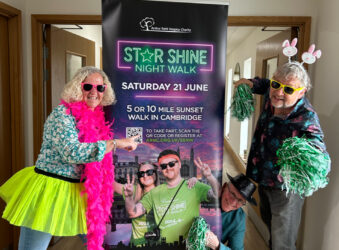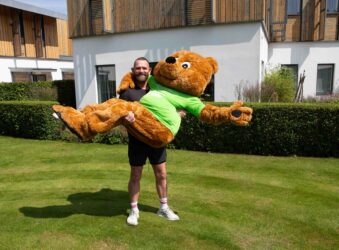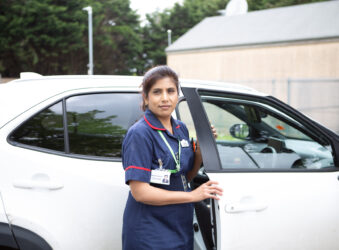Caline’s story
Share this story
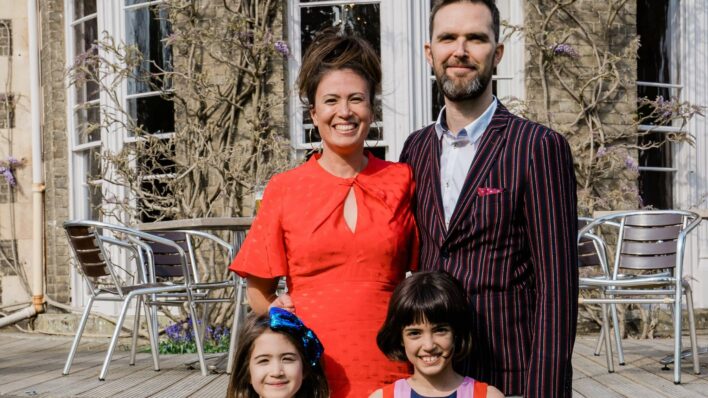
“Mark’s experience taught me that you can have a very positive death experience.”
Caline’s husband Mark was cared for at the end of his life by Arthur Rank Hospice, in late summer 2020.
Now, inspired by the care she and her husband received, she is training to become a Death Doula. This means she will work to ensure that people who are nearing the end of their lives are getting the best support they can have, and are living as pain-free as possible, depending on their situation.
“I was fortunate that I got to be with Mark when he died, at the Inpatient Unit at the Hospice. We were all there with him. The staff there were very supportive – beyond amazing! I can never thank the staff enough for being so brilliant. He was very well looked after. At Arthur Rank Hospice, you’re kept in the loop with what’s happening, and there’s always someone to discuss the situation with.”
Understanding that the Hospice can support from first diagnosis
When Caline and Mark were first referred to Arthur Rank Hospice in December 2017, it was immediately after his diagnosis with Stage 4 prostate cancer, 2 years and 9 months prior to his death. With the prospect of life-prolonging treatments lining the road ahead of them, it was difficult for the couple to understand why a hospice would be reaching out to support them this early on. They didn’t know then about the breadth of the Hospice’s services of support and care now available to them.
Two years later, after a bad spell, Mark was back on the radar of the Hospice’s community team. As a result, in late 2019 the couple received joint counselling from the Patient and Family Support team, as well as reflexology sessions with the Complementary Therapy team. Louise, a nurse in the Hospice’s Community Team, visited Mark at home to assist with pain management. The Charity’s services helped the couple not just to cope, but to live well, with Mark’s progressive illness.
In spring 2020, the global pandemic was impacting every area of life. Having worked from home for several weeks, Mark eventually stopped work in April, and in May the family received the distressing news that the cancer had spread to his brain, a rare occurrence for this type.
In the following weeks, there were two periods of hospitalisation. By this time, his mobility and energy had both significantly decreased. Staying on top of a complicated regime of medication as well as caring for his physical needs, Caline persevered as Mark’s fulltime carer until she was “on the verge of collapse”. Caring fulltime for a loved one can be exhausting; emotionally, mentally and physically.
Accepting support
By June 2020, Mark was still determined to fight his cancer, and was struggling to accept their new reality. In an effort to help him realise the gravity of recent developments, Caline called for the assistance of Mark’s oncologist, who reiterated what the Arthur Rank Hospice’s expert medical team had said – that, sadly, there were only weeks to live at this point. Caline explains that “there was a real mental and emotional struggle to make peace with the change in direction from receiving life-prolonging treatment, to the necessary palliative care appropriate for this new stage”.
When the clinical team called to offer Mark a bed on the Inpatient Unit at the Hospice, he needed some persuading, explains Caline:
“I’m so glad he decided to go in. I had to persuade him to take the bed when it was offered. The fact he relented, and went into the Inpatient ward, was such a relief for me. He was in the right place, and we could get his medications under control. I could concentrate on being with him, rather than running around after him. I would have loved for him to have been at home, but COVID made that so difficult with all the limitations on people coming into our house to help me. I wanted the help, and the team on the Hospice’s Inpatient Unit made it easy for me to be with Mark 24 hours a day. It was the best solution for us.”
Valuable time together
Mark was admitted to the ward on 21 August 2020, in the thick of a global pandemic and the day before the couple’s wedding anniversary. The Inpatient Unit team pulled out all the stops to ensure that Mark and Caline could enjoy what was likely to be their final wedding anniversary together. Closing off the family room, they set the table for a special dinner ordered in from Mark’s favourite Japanese restaurant. The room was decorated with fairy lights and music played in the background as they enjoyed their food, Caline with a cocktail and Mark with a beer.
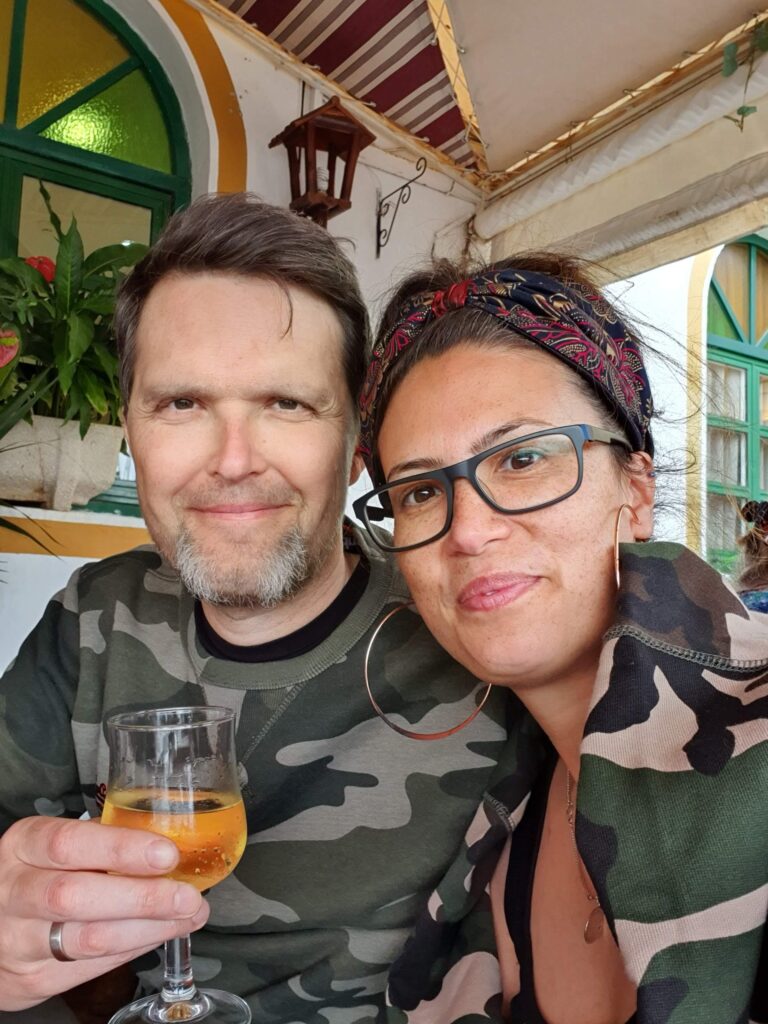
“He didn’t have much energy, but I think he realised this would be our last anniversary together. It was difficult for him to shower but the staff helped him, and I brought some nice clothes in. I wheeled him to the family room and we had a lovely dinner together. I’ll never forget it.”
The couple’s children, Luna (11) and Skye (9) have been on the journey with Caline the whole way, from Mark’s diagnosis to his death. They all appreciated the extra family time they had together at home, due to school closures in response to the pandemic. At the same time, the children saw close-up the stages of their dad dying. “They’re very resilient, and they had to grow up a bit more quickly than their peers, because of that”, Caline reflects.
While Caline advocates for families having the difficult conversations about dying before the time comes, she admits that nothing can fully prepare you for seeing someone you love die.
“Life is for living, but in order to appreciate life and get on with the act of living, you have to accept that death is part of it.”
Caline’s decision to become a Death Doula
The podcast, ‘You Me and The Big C’, as well as the book ‘With the end in mind’ by Kathryn Mannix, helped Caline understand what to expect, not only as a result of Mark’s death, but also of her father’s death, two years prior. She also attended a talk at Arthur Rank Hospice where she met a Death Doula. She returned home sure that she wanted to pursue this training for herself. Telling Mark, she says he thought it a bit morbid, to start with.
“But it doesn’t have to be”, Caline explains. “it’s about offering holistic support to ensure people are getting that joined-up care, especially for people who might be alone otherwise. My kids are very accepting that this is what I want to do – they aren’t phased by it, we’ve had these discussions and they understand.”
Fundraising through Facebook
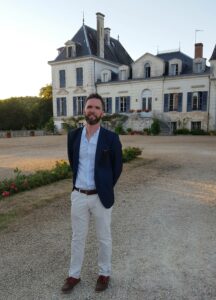
While Mark was being cared for on the Inpatient Unit, Caline set up a Facebook Fundraiser for her birthday, inviting donations to Arthur Rank Hospice Charity in light of the care they were receiving. Sooner than expected, at 3.55am the next day (1 September 2020), Mark died. The donation page was now being shared across their networks; because of the circumstances it became a fundraiser in memory of Mark.
Striking a chord with their community, Caline was overwhelmed to see friends, and friends of friends, and friends of Mark’s who she’d not met, actively and generously donating to Arthur Rank Hospice Charity, exceeding her expectations.
“I want to spread the word and educate others about the Hospice, which is about so much more than just the end of your life. It’s so important we support this vital resource in our community.”
Amazingly, Caline’s first Facebook Fundraiser helped to bring in over £5,400 in vital funds for the Charity, helping ensure other patients will also receive the specialist wrap-around care and support they and their families need at all stages of their journey.
“The staff’s empathy, care, support and compassion – I’ll never forget that.”
View other stories
-

Friends walk for Sherrall at Star Shine Night Walk 2025
A group of 18 friends from Royston walk in memory of Motor Neurone Disease Patient, Sherrall
-

Hospice supporter takes on Hyrox challenge in memory of his Coach
Ben Blowes will be taking on 31 Hyrox Challenges in 31 days
-

G Webb Haulage take to the skies for Arthur Rank Hospice Charity
Fifteen courageous members of the team raised an incredible £16,249 for the Charity
-

Cultural Beliefs observed by Hospice at Home Team
Ali passed away peacefully and pain free at home

